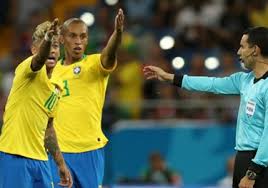By Andrew Warshaw
June 20 – It was bound to happen. For every wrong decision that has been corrected by VAR on its World Cup debut, a string of other seemingly obvious mistakes have been allowed to stand, leading to widespread confusion among players and fans alike about the system’s effectiveness.
Before the tournament began FIFA re-stated that VAR should only be used to “correct clear and obvious errors and missed incidents in clearly defined match-changing decisions” and last week FIFA refereeing officials went to great lengths to assure the media – and by extension the world at large – that although the video assistant referee system wouldn’t solve everything, officials had been given strict instructions as to when and how to implement it.
The media briefing showed video clips that had apparently been seen by all 32 participating nations of incidents that would not be tolerated. They included grappling in the box, with FIFA’s refereeing director Massimo Busacca saying players had been warned they could not get away with it.
The technology has been used successfully several times already, not least when it comes to awarding penalties. But its inconsistency has come under severe scrutiny, notably in England’s 2-1 win over Tunisia when England captain Harry Kane was wrestled twice to the ground inside the area with not a hint of VAR intervention. Earlier in the game Tunisia scored from a penalty of their own controversially awarded by referee Wilmar Roldan.
“I think if it’s a penalty at one end, it has to be one at the other,” England manager Gareth Southgate said afterwards, expressing the views of most of the watching public.
Brazil have gone a step further and lodged a complaint to FIFA following another contentious call during their 1-1 draw against Switzerland.
Brazil felt defender Miranda was pushed by Steven Zuber when he headed Switzerland level – and that they should have a spot kick of their own.
“The CBF requires to know from FIFA the reason the technology was not used in key incidents during the game,” their federation said in a statement.
Although statistics from the past couple of seasons prove that VARs clear up a majority of game-changing errors that would otherwise never have been altered, former Premier League referee Mark Halsey believes it is far too early to implement the system in Russia .
He told BBC radio: “I think there’s a lot more training and education to be done because it should not be in this tournament. They should be looking at it to bring it in for the 2022 qualifying stages and then into the tournament.”
Contact the writer of this story at moc.l1713493153labto1713493153ofdlr1713493153owedi1713493153sni@w1713493153ahsra1713493153w.wer1713493153dna1713493153

